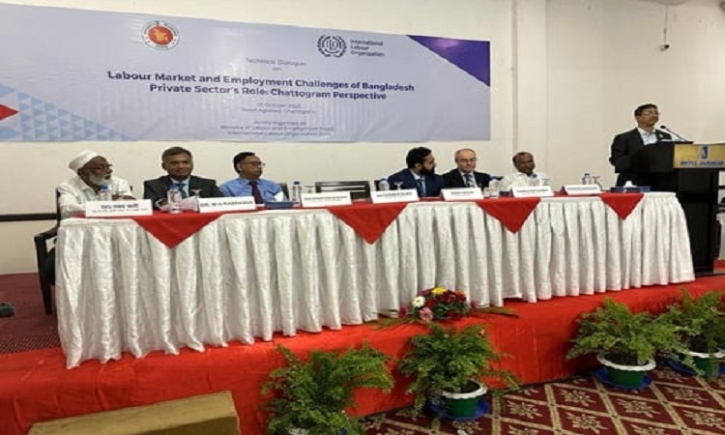Dialogue on critical labour market challenges in Chattogram area held
BI Report || BusinessInsider

Photo: Collected
Dialogue on critical labour market challenges in Chattogram area held
The International Labour Organization (ILO) and the Ministry of Labour and Employment (MoLE) on Sunday organized a technical dialogue on "Labour Market and Employment Challenges of Bangladesh and the Private Sector's Role: Chattogram Perspective".
The objective of the technical dialogue was to discuss the critical challenges arising from current labour market trends focusing in Chattogram area of Bangladesh and the role of private sector to address those. The dialogue was held at a hotel in the port city, said a press release, reports BSS.
While speaking at the dialogue as the chief guest, Md Ehsan-E-Elahi, secretary, Ministry of Labour and Employment noted that the Ministry is committed to establish an Employment Directorate and collaborate with other ministries involved in employment matters at various levels, including policy development, implementation, strategy, and coordination.
He further stressed on the joint leadership (Government and private sector collaboration) approach to ensure effective implementation of the national employment policy.
Tuomo Poutiainen, country director for ILO Bangladesh stressed the need for a comprehensive and modern National Employment Policy to address contemporary challenges in job creation, employment quality, skills development, social protection, and labour practices.
The policy is crucial for a smooth transition for LDC graduation and enhancing global competitiveness, he said.
"Chattogram is touted as the commercial capital of Bangladesh, and is the trade, investment, and employment hub of the country, with over 90 per cent of international trade passing through its ports, and with ongoing mega projects of the Government," added Poutiainen.
He said that Chattogram is being prepared as an ideal investment destination in South Asia, potentially creating millions of new jobs opportunities in -- the Bangabandhu Sheikh Mujib Shilpa Nagar – which itself anticipates the creation of over 1.5 million jobs in the next 15 years.
The ILO country director further stressed on ILO's commitment in providing technical assistance in the areas of full, productive and decent employment, occupational health and safety, social protection, sustainable enterprises, and good labour practices, and partnering with public and private stakeholders in Chattogram to drive prosperity and progress, aligning with the vision of transforming Bangladesh into a smart economy.
At the technical dialogue session, Dr MA Razzaque, Chairman of Research and Policy Integration for Development (RAPID), delivered the keynote presentation that shed light on the employment policy, context, and labour market challenges in Bangladesh.
He emphasized on the appropriate implementation of the employment policy that needs to build the institutional capacity of the ministry of labour, focusing on the social protection of the workers in the informal economy, analyzing demand-supply gap of high potential sectors for employment and counting underemployment as crucial as unemployment and the pivotal role of the private sector.
The technical dialogue was attended by Md Ehsan-E-Elahi, Secretary, Ministry of Labour and Employment as chief guest while Omar Hazzaz, President, CCCI, Mohammed Erfan Sharif, additional secretary, BEZA, and Mohammad Shamim Alam, additional divisional commissioner general were in the attendees as special guests.
Dr M A Razzaque presented the keynote speaker. Wasfi Tamim, CEO, BCE, and Safar Ali, Member, Sromik Kalyan Oikka Parishad, and various government agencies, employers and workers organizations and development partners were present, among others.
























